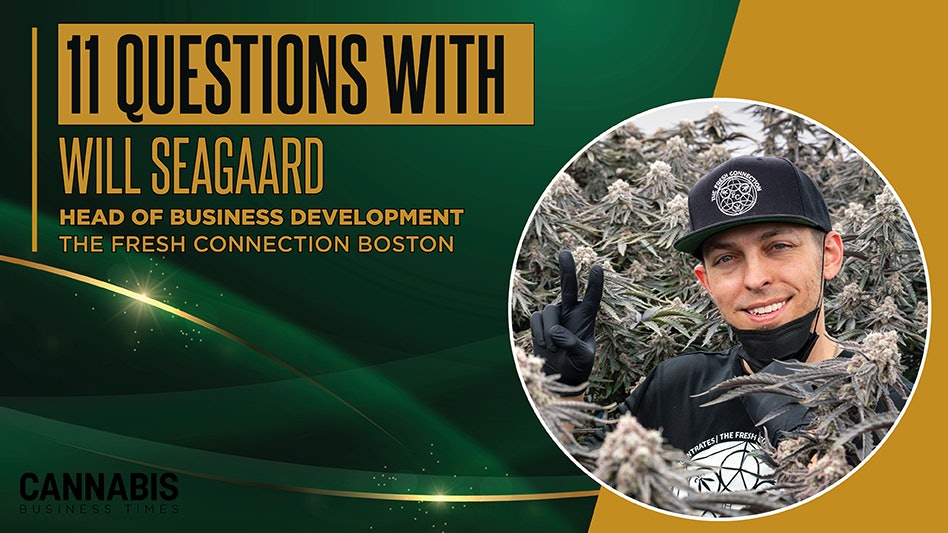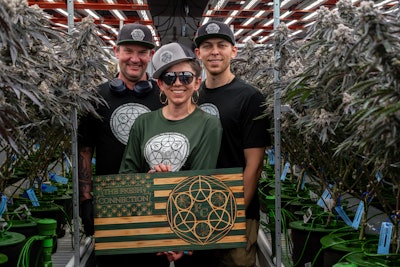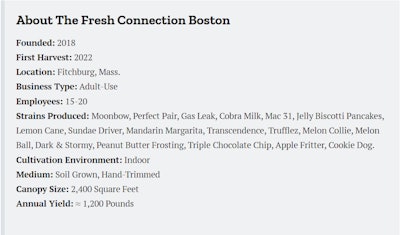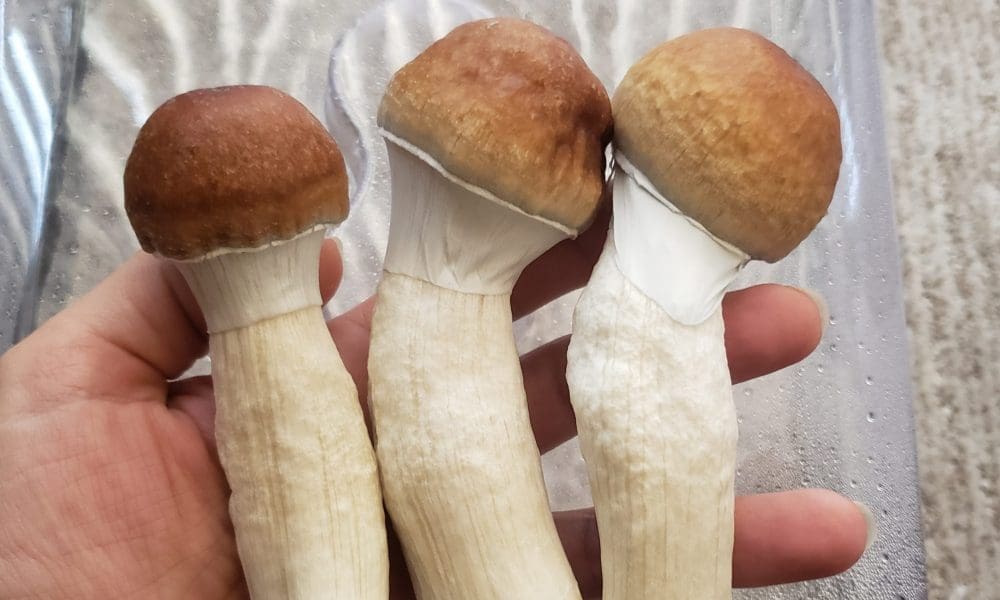featured
The Massachusetts Cannabis Trail: How The Fresh Connection Thrives in a Competitive Market
Published
14 hours agoon

Much like westward-bound pioneers in the 1840s migrated to Oregon and California in search of new economic opportunities, cannabis industry pioneers flocked West at the turn of the 21st century to seek out legalization.
For siblings Will Seagaard and Samantha Seagaard, the West Coast didn’t necessarily represent a final destination but rather a starting point for their now-thriving business: The Fresh Connection Boston, where Will serves as the head of business development and Samantha as CEO. The New Jersey natives co-founded the craft cannabis company in 2018 with partner Zach Swanson, their head of cultivation.
The trio’s soil-grown, hand-trimmed cannabis operation is now equipped with one of the largest genomic libraries in the state, with more than 200 strains grown. But their focus on producing cannabinoid and terpene-rich flower and concentrates predates Massachusetts’ legalization days.
 Zach Swanson (from left), Samantha Seagaard and Will Seagaard co-founded The Fresh Connection Boston in 2018.Photos courtesy of The Fresh Connection Boston
Zach Swanson (from left), Samantha Seagaard and Will Seagaard co-founded The Fresh Connection Boston in 2018.Photos courtesy of The Fresh Connection Boston
Samantha, who tested her green thumb as a teenager, was drawn to Oregon’s medical cannabis market when she moved West to attend college. After graduating, she honed her trim skills in California before she began growing and supplying cannabis to Oregon retailers around the time that then-Gov. John Kitzhaber signed legislation in August 2013 to establish regulations for state-licensed medical cannabis dispensaries.
Although Oregon voters legalized medical cannabis in the November 1998 election, dispensaries had largely operated in a legal gray area until President Barack Obama’s then-Deputy Attorney General David Ogden directed U.S. attorneys to take a hands-off approach to prosecuting state-sanctioned medical cannabis activities in an October 2009 memo.
As Oregon’s market expanded to adult use in 2015, Will was working in finance in Massachusetts but would regularly visit his older sister in Oregon to help out during harvest time. From his perspective, he knew legalization would soon expand East.
“I was really focused on figuring out a way to help her take the skills that she had learned and utilize them and kind of bring them home, if you will, so that we could do what she was doing out there, and gained all the knowledge on, and do them out here,” he said. “So that’s sort of in a very short nutshell what happened.”
Massachusetts was the first state east of the Mississippi River to legalize adult-use cannabis in November 2016, paving the way for Samantha and Swanson, an Oregon native whom she met through common friends, to bring their talents to the East Coast. Swanson specifically began his cannabis endeavors as a teenager in the 1980s as a second-generation grower.
Now growing some of the highest-quality cannabis in New England, The Fresh Connection Boston has largely avoided one of the biggest ills of a mature cannabis market: oversaturation.
“For us, we’re not producing huge amounts, so we’re able to turn over our inventory very regularly,” Will said. “I probably have the lowest inventory stock of most people in the state, and I like to keep it that way.”
Below, Will Seagaard details The Fresh Connection’s methods and how the company stands out in Massachusetts’ competitive cannabis marketplace.

Editor’s note: This interview has been edited for style, length and clarity.
Tony Lange: As a New Jersey native, how did you get into the Massachusetts cannabis space?
Will Seagaard: My older sister is the one who really started in this space, and she had a business out in Oregon. She was supplying medical dispensaries and then worked in the recreational cannabis space out there. And I was living in Massachusetts, working in finance, always was interested in the industry, and knew that eventually it would be going legal here on the East Coast, in the Northeast, where we are from.
We had a farm in Oregon as well, where we grew hemp and did CBD products and all kinds of stuff, but really, the focus for me was always the Northeast and focusing on how we could do that legally over here. So, in 2016, the laws changed, everything got passed, and then we immediately started looking for a building and some space here in which to do this. We finally bought our building in 2018, took about four years to go through all the licensing and the build-out, and all that good stuff. Once we finally did that, we opened in 2022, and we’ve been successful up until this point.
Lange: How did you and Samantha connect with Zach to co-found The Fresh Connection Boston?
Seagaard: Zach was working out in Oregon as a medical cultivator. Samantha and Zach had some mutual friends, and she was looking for an operational partner to help her on the cultivation side. And so that’s sort of how things transpired there. That was before she was focused on coming back to Massachusetts, but they started working together, and things were going well. Zach has a ton of knowledge and really handles most of the cultivation, like plant-specific items. And I think he just saw that there was a big opportunity and a huge market out here to capitalize on, and he has a wealth of knowledge and wanted to share that a bit with the world in his own way.
Lange: With roughly 200 licensed cannabis cultivators in Massachusetts, what makes the quality of your flower stand out in the state marketplace?
Seagaard: I think it’s all the attention to the little details that we put into it, and just the small-batch nature of what we’re doing. We don’t have a huge facility. We’re just laser-focused on putting out the best of the best across the board, from the genetics that we have to our processes to all those things that have been honed over decades of experience. All it takes is one misstep, and you can ruin the whole batch, so you really need to make sure that every little detail is covered. And so, it’s really just our experience and the fact that we’ve done it so many times and have messed up a lot of batches in the past, but we’ve learned from that and just learned from all those mistakes to make sure that they don’t get repeated. And then trying to impart all of that on our team. Ultimately, we’re only as good as the team we have behind us, and we’ve been able to find some great, key people here in Massachusetts as well to help. And they love what they do. We love what we do. So, it makes it just a little bit easier every day.
 Samantha Seagaard, CEO, and Will Seagaard, Head of Business Development, The Fresh Connection Boston.Photo courtesy of the Fresh Connection
Samantha Seagaard, CEO, and Will Seagaard, Head of Business Development, The Fresh Connection Boston.Photo courtesy of the Fresh Connection
Lange: So, was there a memorable mess-up that you learned from that stands out?
Seagaard: I think by the time we got to Massachusetts, we had most of our “uh-oh” moments out of the way. Once we got here, it was more just about dialing in all the systems that we have in place, because it’s so dependent on the environment, right? Here in Massachusetts, the seasonal humidity variations are something you have to focus on and deal with in your production facility. Those things have a huge, huge impact on your process and the environment, and ultimately what you’re going to do with your products, because you can’t work with them if the room is 0% humidity or 95% humidity.
Lange: What cultivation method will the Fresh Connection stay true to and not cut corners on or stray away from?
Seagaard: We’re not going to grow things that aren’t in soil for one. That’s really what gives, in our opinion, the product its appeal. That’s why we’re not the same as a lot of these other huge, mass-produced items; a lot of it comes down to the soil, and that we’re doing things by hand. So, we’re able to take the time and the care to make sure that everything you’re getting has been looked at by a team of people, not just one person who might miss something. It’s been looked over by a team of people, so you can ensure that every single harvest you get it’s going to be the best it can be.
Lange: What’s something you’re doing differently in 2025 compared to when The Fresh Connection first got its start, and how has that made a difference?
Seagaard: We do a ton of R&D every single day in our facility. We have an in-house testing lab that we can see essentially throughout the whole grow cycle what the plant is producing for cannabinoids, which allows us to dial it in based on that and adapt our growing practices so we can get the maximum output. We track everything and just make sure that we’re laser-focused. It’s all about the small stuff, and that’s what we’re super focused on. We check trichomes before we harvest, we always look at everything under microscopes and just make sure that it’s at the optimal ripeness, and you really want to shoot for a certain level of finish on the trichomes so that they all haven’t turned to CBN or anything like that, but also not harvest too early where it hasn’t finished up that production. And that depends on what strain we’re producing.
 Jelly Biscotti Pancakes – An extremely fragrant cross between Biscotti Pancakes x Jealousy this strain has a sweet/creamy vanilla aroma with a hint of umami notes on the finish. Photo courtesy of The Fresh Connection
Jelly Biscotti Pancakes – An extremely fragrant cross between Biscotti Pancakes x Jealousy this strain has a sweet/creamy vanilla aroma with a hint of umami notes on the finish. Photo courtesy of The Fresh Connection
Lange: How many strains are you currently cultivating, and how do you decide what you’re going to grow in each cycle?
Seagaard: At any one time, we might have 20 strains at different stages of the cycle, whether it’s pheno-hunting or in full production or anything like that. We have almost 250 strains in our library. And we don’t run all of them all the time, but we’re constantly looking for that new next best thing. A lot of it comes down to what we have in inventory, and we do a lot of phasing things out. So, we’ve grown quite a few things that we did a run of, but it doesn’t quite hit our specs as far as keeping it in the rotation. And so, we phased it out, or we found something else, and we’re just like, “OK, we don’t have room to keep all of this going,” because we found something ever so slightly better.
Lange: Do you have a traditional bestseller?
Seagaard: Our sativa strains always sell, usually. It’s really dependent. We’ve got a couple of strains that we’re pretty well-known for, like our Moonbow. We actually had one that everybody loved, but it just did not produce the way we needed it to in order to make it economically viable to run for us. So, we had to pull that out of rotation, but that one was amazing—our Jelly Biscotti Pancakes. And then our Mac 31, which is our pheno of the Mac strain, everybody loves that. That’s been a top seller for us pretty consistently. We don’t always grow it. We do it in phases just because we don’t have enough space to keep growing the same strain on repeat. So, we’ll do a cycle of it, and then it might be six, eight, or 10 months before we bring it back.
 Perfect Pair – This frosty strain is a cross between Kush4BReakfast’s wonderfully soothing Smarties and Tiki Madman’s energizing Devil Driver.Photo courtesy of The Fresh Connection
Perfect Pair – This frosty strain is a cross between Kush4BReakfast’s wonderfully soothing Smarties and Tiki Madman’s energizing Devil Driver.Photo courtesy of The Fresh Connection
Lange: What’s the most invaluable piece of your operation that helps ensure your product quality and consistency with each and every grow?
Seagaard: I would say the people, first and foremost. You can’t replace that, because nothing is infallible, right? You might have an amazing piece of equipment, but if you don’t have somebody who knows how to use it, it’s useless. You’ve just got to make it a good place to work and make it a place that everybody wants to be a part of. That’s kind of been our mantra. And we don’t ask any of our employees to do anything that we probably don’t actively do ourselves. So, I think that’s an important piece of it, and properly compensating people for their time and understanding that they’re people too, and things come up. Also, we are there training them directly and managing things directly on a day-to-day basis, so we know about things being problems before they become major issues, because we’re there. I think that’s the key.
Lange: What’s been your biggest challenge in the Massachusetts marketplace?
Seagaard: It depends on where in the process we’re talking. Obviously, the regulatory environment is pretty intense here in Massachusetts. It’s the home of bureaucracy, essentially. Our state government is older than the U.S. government, so they like their rules a lot. But I think aside from that, it’s a very, very competitive market. And so, you have to have your finger on the pulse of what’s going on. For us, we’re not producing huge amounts, so we’re able to turn over our inventory very regularly. I probably have the lowest inventory stock of most people in the state, and I like to keep it that way, but it doesn’t make it any easier necessarily to keep all the balls in motion.
Lange: A big storyline in Massachusetts has been the falling prices at retail. Flower is selling at around $125 per ounce when three years ago it was more than $300 per ounce. How has that impacted you as a grower?
Seagaard: It’s definitely tightened our margins quite a bit. We’re probably more insulated than a lot of the bigger companies just because of the size of our production. But you definitely feel it. Everybody’s getting squeezed a little more every day. That being said, we do have some amazing retail partners, so they’ve all in all been great to work with. I think we’re fortunate in that we haven’t been affected quite as much as a lot of other people have. But there’s a confluence of factors that determine what [local] markets we can do business in. On my side, I can’t really control the economic environment, so I try not to sweat it quite as much and just focus on the things that we can control.
 Will Seagaard, Head of Business Development, The Fresh Connection BostonPhoto courtesy of The Fresh Connection
Will Seagaard, Head of Business Development, The Fresh Connection BostonPhoto courtesy of The Fresh Connection

Author: mscannabiz.com
MScannaBIZ for all you Mississippi Cannabis News and Information.
You may like
-


Alaska Activists Launch Campaign To Put Psychedelics Legalization Measure On 2026 Ballot
-


Best dab rigs of 2025 by Leafly
-


High Times Magazine Acquired for $3.5M by RAW Rolling Papers Owner
-


Connecticut Man Busted with $8.5M Worth of Shrooms
-


Mississippi Choctaws to Elect Tribal Council Representatives
-


Delaware Lawmaker Withdraws Bill To Regulate Hemp-Derived THC Drinks
featured
Alaska Activists Launch Campaign To Put Psychedelics Legalization Measure On 2026 Ballot
Published
1 minute agoon
June 17, 2025
Activists in Alaska are working to put a measure on the 2026 state ballot to legalize certain psychedelics—including psilocybin, mescaline and DMT—and create a state-regulated system for facilitated use.
The group Natural Medicine Alaska this week officially began gathering signatures in the cities of Anchorage and Palmer as part of a first step in the state’s initiative process.
Organizers first have to submit 100 signatures of qualified registered voters to get the process rolling. From there, the state Lt. Gov. Nancy Dahlstrom (R) has 60 days to decide whether to certify the proposal for further signature gathering to qualify for the 2026 ballot.
While language of the prospective ballot measure is not available on Natural Medicine Alaska’s website—and the group did not immediately respond to an emailed request from Marijuana Moment—a policy outline explains the plan as “building off of” Colorado’s voter-approved 2022 Natural Medicine Health Act, under which facilitators recently administered the state’s first legal dose of psilocybin.
The Alaska proposal would legalize non-commercial use, cultivation and sharing of DMT, non-peyote mescaline, psilocybin and psilocin under a so-called “grow, gather, gift” model popular among psychedelic reform proponents.
It would further create a state-regulated program where adults would be administered natural medicines in a supervised setting, and it would allow certain medical professionals to “prescribe and dispense microdoses…to patients.”
The policy outline says the measure “shifts away from a restrictive healing center model, allowing individual practitioners to provide [natural medicine] in their offices and at-home facilitation, increasing accessibility in rural communities” common in Alaska.
Facilities would need to be “majority Alaska-owned, ensuring economic benefits stay within the state.”
Traditional healers would also be protected under the proposed initiative for “ceremonial, spiritual, or cultural use of plant medicines” through legal exemptions to state drug laws.
“We see a future where natural medicines are available as an option to all who are seeking out healing and well-being, a future where education on these medicines empowers the Alaskan community with legalized personal use of psilocybin and other natural psychedelics,” says a Natural Medicine Alaska campaign video uploaded to YouTube in February. “We see an Alaska transformed by the decriminalization of entheogens into a regulated and supportive environment for the therapeutic use of psychedelics.”

One natural medicine, ibogaine, would be specifically prohibited for personal use, though ibogaine treatment centers are included in the proposal as component “to be implemented once Alaska’s regulated access program is established.”
“Traditional use [of iboga] by highly trained and recognized practitioners” would also be protected under the plan.
Other provisions in the policy outline include expungement and record-clearing for past criminal offenses related to natural medicine, local protections “for active duty [military] members, law enforcement and first responders who use [natural medicines] covered under the initiative” and support for synthetic versions of ibogaine “to promote sustainability and prevent overharvesting of natural sources.”
Alaska would be further required under the proposal, the outline says, “to provide psychedelic crisis assessment and intervention training for first responders to enhance their knowledge and skills to quickly and effectively respond to emotional and behavioral crisis events involving [natural medicines].”
A poll last year found that nearly half (49.4 percent) of adults in Alaska would support a ballot measure to more broadly remove criminal penalties for using substances such as psilocybin mushrooms.
That support rose markedly—to nearly two thirds (65 percent)—when participants were told that Alaska has high rates of mental illnesses that could potentially be treated with psychedelics.
Last year, Alaska lawmakers passed legislation to create a state task force to study how to license and regulate psychedelic-assisted therapy. The measure took effect without the signature of Gov. Mike Dunleavy (R).
So far two other states have facilitated psychedelics programs that are fully operational. Oregon voters legalized therapeutic psilocybin in 2020, and Colorado’s program was passed at the ballot box in 2022, with the state’s governor signing legislation a year later to create the regulatory framework for the program.
In Oregon, more people could eventually access legal psilocybin following a recent federal court ruling in favor of plaintiffs who argued that the state’s first-in-the nation psilocybin law wrongfully prevents homebound patients from seeking care.
Four care providers—three licensed psilocybin facilitators and a physician specializing in advanced and terminal illnesses—sued the state about year ago, alleging that the state Psilocybin Services Act (PSA) discriminates against disabled individuals who can’t travel to designated service centers where the substance is administered.
In Maine, meanwhile, lawmakers last week reversed course and rejected a bill to legalize possession of up to one ounce of psilocybin by people 21 and older.
At the federal level, attorneys for a doctor seeking to reschedule psilocybin so he can administer it to terminally ill patients recently demanded an update from the Drug Enforcement Administration, which previously agreed to submit a request for a scientific review of the psychedelic from the U.S. Department of Health and Human Services.
Separately in Alaska, a federal judge ruled late last month that state officials did not violate the constitution when restricting intoxicating hemp products in 2023.
GOP Senators File Bill To Ramp Up Criminalization Of ‘Candy-Flavored’ Marijuana Edibles

Author: mscannabiz.com
MScannaBIZ for all you Mississippi Cannabis News and Information.
featured
High Times Magazine Acquired for $3.5M by RAW Rolling Papers Owner
Published
1 hour agoon
June 17, 2025
 Founded in 1974, High Times rose to prominence as an underground icon. In recent years, the brand fell into receivership, leaving its future uncertain. Josh Kesselman, Founder of RAW Rolling Papers, has personally purchased High Times and its associated assets in an all-cash transaction. Kesselman wants the rebirth of High Times to galvanize the cannabis community and reinvigorate the interest of newer generations in this incredible culture and its legends.Courtesy of Just Jessse
Founded in 1974, High Times rose to prominence as an underground icon. In recent years, the brand fell into receivership, leaving its future uncertain. Josh Kesselman, Founder of RAW Rolling Papers, has personally purchased High Times and its associated assets in an all-cash transaction. Kesselman wants the rebirth of High Times to galvanize the cannabis community and reinvigorate the interest of newer generations in this incredible culture and its legends.Courtesy of Just Jessse
Josh Kesselman, the entrepreneur and founder of RAW Rolling Papers, has personally purchased exclusively the magazine, Cannabis Cups and associated assets in an all-cash transaction. Alongside partner and former 2000s-era High Times co-owner Matt Stang, this $3.5 million acquisition revives the publishing powerhouse that featured counterculture legends like Charles Bukowski, Willie Nelson, Debbie Harry, Hunter S. Thompson and Bob Marley.
Founded in 1974, High Times rose to prominence as an underground icon. In recent years, the brand fell into receivership, leaving its future uncertain. Kesselman wants its rebirth to galvanize the cannabis community and reinvigorate newer generations’ interest in this incredible culture and its legends.
“This is a ‘pinch yourself’ kind of moment for me, just unbelievable,” Kesselman said. “Eighteen-year-old stoner Josh would be in complete disbelief that I get to bring back a piece of history that has played such an important part in culture and impacted so many lives, including my own. This feels like a dream. Having Matt Stang, an OG and a former owner-operator of the magazine, involved in this acquisition just makes it all come full circle. It’s surreal to be a small part of giving back to the community that helped make me.”
High Times will soon be relaunched as a comprehensive platform serving as a hub for information and connection, mixing legacy with modern relevance. Plans include:
- Relaunching the print magazine in limited-run, collectible editions.
- Reintroducing the iconic Cannabis Cup event series, with third-party judging and zero pay-to-play involvement, returning legitimacy to the industry’s most revered competition.
- Rebuilding the digital platform to host a curated network of cannabis podcasts, experts and community voices.
- Commemorating the brand’s 50-year legacy and heralding the future of free thinking.
- Protecting the truth of the power of the plant.
“This incarnation of High Times is going to be bigger and better than ever,” Stang said. “As an original owner-operator, I’m energized about my partnership with Josh—we’re not just reviving High Times as a news source; we’re positioning it as a guiding light for culture and a definitive authority on all things cannabis and psychedelics. At its heart, this is about reigniting the passion of longtime fans while inspiring a new generation to carry the torch forward. It’s about sharing, connection and honoring the culture that we love so dearly.”
“Our goal is to rebuild the voice of authenticity that defined High Times’ legacy, to cut through the controversy of inaccurate information, create a truly cross-generational community, and restore High Times to its rightful place as an international beacon of counterculture,” Kesselman said. “And most importantly? HAVE FUN while doing it.”
The first revamped Cannabis Cup is expected to return in early 2026.

Author: mscannabiz.com
MScannaBIZ for all you Mississippi Cannabis News and Information.
A Burlington, Connecticut man was busted for allegedly growing psilocybin mushrooms in a large, commercial-style factory with an estimated $8.5 million in street value. Weston Soule, 21, is accused of allegedly growing millions’ worth of psilocybin mushrooms. He was charged with possession with intent to sell narcotics and the operating of a drug factory.
An unidentified person snitched out Soule, police said. Agents from the DEA Hartford Task force and state police detectives received a tip that suggested a man was operating a clandestine psilocybin mushroom growing operation at a home on Lyon Road.
WFSB Hartford reported that law enforcement agents descended upon Soule’s home on Thursday morning. Once there, authorities said they talked to Soule and saw ventilation equipment throughout the residence that are consistent with psilocybin operations.
Soule led investigators to a detached garage on his property and police found his large mushroom growing operation, where Soule claimed he was simply growing a different type of mushroom.
When Soule initially denied police entry to his home, police submitted a search warrant to New Britain Superior Court, which was granted. Once the search warrant was approved, investigators said they found a large “mushroom factory” with multilevel racks neatly lined up with substrates, inoculation chambers, grains, nutrients, and other supplies. The grow factory contained psilocybin mushrooms in various stages of growth, with an estimated total street value of $8.5 million.
Soule was taken into custody at the scene and transported to state police headquarters in Litchfield, Connecticut where he was processed and charged. Neighbors say a series of factors indicated a grow operation was taking place.
“They were running air conditioners when it was a cold day which didn’t seem right. They had air conditioners in the top windows and front of the house. You also saw more cars there during the day which made it seem like a place of employment rather than someone sleeping there at night,” an eyewitness neighbor told WFSB Hartford.
UNH Criminal Justice Professor and retired FBI agent Kenneth Gray says that’s a usual sign in this operation. “In a marijuana grow house, the house is usually filled with lamps. In this case, mushrooms don’t need a lot of lamps, instead, they need a lot of ventilation,” Gray said.
Soule was held in jail on a $250,000 cash/surety bond and was scheduled to appear for arraignment at New Britain Superior Court on Friday.
Psilocybin Reform in Connecticut
People in Connecticut are also attempting to regulate the cultivation of it legally. In 2021, Dr. Bronner’s pushed for psilocybin reform in Connecticut. New Approach PAC, a lobbyist group, funded $14,000 in 2021 to local firm Grossman Solutions to promote drug policy reform in Connecticut. Dr. Bronner’s is among New Approach’s biggest donors.
CT Insider reported that a task force in Connecticut is examining the efficacy of psilocybin mushrooms for use in therapeutic settings. House Bill 6296, sponsored by Representative Josh Elliot and four other representatives, created a task force responsible for studying the efficacy of psilocybin for a variety of conditions—a key step in legalizing psilocybin for therapeutic purposes. Grossman Solutions will help New Approach engage with Connecticut’s psilocybin task force.
CEO David Bronner is the grandson of company founder Emil Bronner. He said his goal is to free psychedelics, specifically legalization of psilocybin for therapeutic purposes, adding it’s exactly what his grandfather would have done. “The passion of my grandfather was to unite spaceship earth,” Bronner said. “We honor that legacy in different ways,” among them “integration of psychedelic healing in medicine and therapy.” Bronner also said that he believes “psychedelic medicine can really help people heal and wake up, and grapple with pressing problems.”
A pilot program on the benefits of synthetic psilocybin for mental health issues like post-traumatic stress disorder (PTSD) is launching soon at Yale University in New Haven, Connecticut.
A study cohort will consist of 50 patients, mostly veterans and first responders, who are with mental health concerns like depression and addiction. Participants will take 25 mg of synthetic psilocybin, and after the psychedelic effects wind down, they will discuss issues and progress (or lack thereof) with trained therapists.
Connecticut Post reports that the goal is to fulfill the need for state data that has been lacking, according to state Rep. Michelle Cook (D-Torrington). “We need to have the data to show that there is documented proof of what that therapy does,” Cook said. “We know that it has some incredible outcomes when it is done right, when it’s done by people that are trained in how to use it for treatment of PTSD and so forth.”
Cases like Soule’s would disappear if people in Connecticut gained access to regulated psilocybin as reform bills make their way through legislation.

Author: mscannabiz.com
MScannaBIZ for all you Mississippi Cannabis News and Information.

Alaska Activists Launch Campaign To Put Psychedelics Legalization Measure On 2026 Ballot

Best dab rigs of 2025 by Leafly

High Times Magazine Acquired for $3.5M by RAW Rolling Papers Owner
Connecticut Man Busted with $8.5M Worth of Shrooms

Mississippi Choctaws to Elect Tribal Council Representatives

Delaware Lawmaker Withdraws Bill To Regulate Hemp-Derived THC Drinks

Mississippi AG Limits Sale of Consumable Hemp Products

Dallas-Area Officers Raid 3 Licensed Hemp Distribution Warehouses in ‘Enforcement Overreach’
The Counterculture Giant Reclaims Its Roots

Study: Daily Cannabis Consumers Exhibit Few Changes in Simulated Driving Performance Compared to Controls

Oregon Officials Will Appeal Court Decision That Overturned Marijuana Industry Labor Peace Law

Terrabis Opening 5th Illinois Dispensary in Mundelein

Texas Governor Still Won’t Say If He’ll Sign Hemp Ban Bill, But Thinks There Are ‘Meaningful’ Concerns On Both Sides Of The Debate

A Cannabis Match Made In Heaven

Vireo Growth Provides Corporate Update After Closing All Merger Transactions

Most Marijuana Consumers Oppose Trump’s Cannabis Actions So Far, But Rescheduling Or Legalization Could Bolster Support, Poll Shows

The Massachusetts Cannabis Trail: How The Fresh Connection Thrives in a Competitive Market

Interview with Anna Schwabe, PhD

Will Supreme Court take up cannabis companies’ challenge to federal prohibition? (Newsletter: June 17, 2025)

Drinks containing THC sold at gas stations. Is that legal?

Report: Jeeter is Top Pre-Roll Brand in the U.S.

Oregon Senate Passes Bill to Increase Penalties for Landowners Allowing Illegal Cannabis Cultivation

Letter to Trump Calls for Ending Federal Cannabis Arrests to Save Government Money

GOP Senators File Bill To Ramp Up Criminalization Of ‘Candy-Flavored’ Marijuana Edibles

Alert: Department of Cannabis Control updates data dashboards with full data for 2023

Connecticut Appoints The US’s First Cannabis Ombudsperson – Yes there is a pun in there and I’m Sure Erin Kirk Is Going To Hear It More Than Once!

5 best CBD creams of 2024 by Leafly

Free delta-9 gummies from Bay Smokes

EU initiative begins bid to open access to psychedelic therapies
New Study Analyzes the Effects of THCV, CBD on Weight Loss

Mississippi city official pleads guilty to selling fake CBD products

May 2024 Leafly HighLight: Pink Runtz strain

Curaleaf Start Process Of Getting Their Claws Into The UK’s National Health System – With Former MP (Resigned Today 30/5/24) As The Front Man

5 best autoflower seed banks of 2024 by Leafly

Horn Lake denies cannabis dispensary request to allow sale of drug paraphernalia and Sunday sales | News

Discover New York’s dankest cannabis brands [September 2024]

Press Release: CANNRA Calls for Farm Bill to Clarify Existing State Authority to Regulate Hemp Products

Local medical cannabis dispensary reacts to MSDH pulling Rapid Analytics License – WLBT

Nevada CCB to Accept Applications for Cannabis Establishments in White Pine County – “Only one cultivation and one production license will be awarded in White Pine County”

The Daily Hit: October 2, 2024

6 best CBD gummies of 2024 by Leafly

5 best THC drinks of 2024 by Leafly

5 best delta-9 THC gummies of 2024 by Leafly

Weekly Update: Monday, May 13, 2024 including, New Guide for Renewals & May Board meeting application deadline

People In This State Googled ‘Medical Marijuana’ The Most, Study Shows

PRESS RELEASE : Justice Department Submits Proposed Regulation to Reschedule Marijuana

Press Release: May 9, STIIIZY and Healing Urban Barrios hosted an Expungement Clinic & Second Chance Resource Fair

Thailand: Pro-cannabis advocates rally ahead of the government’s plan to recriminalize the plant
Trending
-

 California Cannabis Updates1 year ago
California Cannabis Updates1 year agoAlert: Department of Cannabis Control updates data dashboards with full data for 2023
-

 Breaking News1 year ago
Breaking News1 year agoConnecticut Appoints The US’s First Cannabis Ombudsperson – Yes there is a pun in there and I’m Sure Erin Kirk Is Going To Hear It More Than Once!
-

 best list11 months ago
best list11 months ago5 best CBD creams of 2024 by Leafly
-

 Bay Smokes12 months ago
Bay Smokes12 months agoFree delta-9 gummies from Bay Smokes
-

 Business9 months ago
Business9 months agoEU initiative begins bid to open access to psychedelic therapies
-

 cbd1 year ago
cbd1 year agoNew Study Analyzes the Effects of THCV, CBD on Weight Loss
-

 Mississippi Cannabis News1 year ago
Mississippi Cannabis News1 year agoMississippi city official pleads guilty to selling fake CBD products
-

 California1 year ago
California1 year agoMay 2024 Leafly HighLight: Pink Runtz strain




